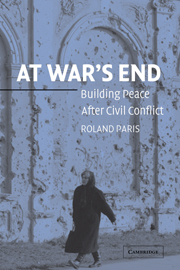Book contents
- Frontmatter
- Contents
- List of Figures
- Preface
- Introduction
- PART I FOUNDATIONS
- PART II THE PEACEBUILDING RECORD
- PART III PROBLEMS AND SOLUTIONS
- 9 The Limits of Wilsonianism: Understanding the Dangers
- 10 Toward More Effective Peacebuilding: Institutionalization Before Liberalization
- 11 Lessons Learned and Not Learned: Kosovo, East Timor, Sierra Leone, and Beyond
- Conclusion
- Bibliography
- Index
11 - Lessons Learned and Not Learned: Kosovo, East Timor, Sierra Leone, and Beyond
Published online by Cambridge University Press: 05 September 2012
- Frontmatter
- Contents
- List of Figures
- Preface
- Introduction
- PART I FOUNDATIONS
- PART II THE PEACEBUILDING RECORD
- PART III PROBLEMS AND SOLUTIONS
- 9 The Limits of Wilsonianism: Understanding the Dangers
- 10 Toward More Effective Peacebuilding: Institutionalization Before Liberalization
- 11 Lessons Learned and Not Learned: Kosovo, East Timor, Sierra Leone, and Beyond
- Conclusion
- Bibliography
- Index
Summary
The peacebuilding operations launched after 1998 in Kosovo, East Timor, and Sierra Leone have moved gradually in the direction of the IBL strategy: They have devoted more attention and resources to the construction of effective institutions and managed the liberalization process more gradually and deliberately than in previous missions. In Kosovo and East Timor, in particular, peacebuilders have served as “transitional authorities” governing these territories while indigenous institutions are being erected.
But while this shift toward IBL is welcome, it has not gone far enough. Peacebuilders in these more recent operations have remained reluctant to commit themselves to the arduous, open-ended, and inevitably slow task of transforming war-shattered states into stable societies, and have continued to place too much emphasis on rapid liberalization at the expense of adequate institutionalization. As a result, many of the problems experienced in earlier missions have recurred in the post-1998 operations.
As this book went to press, two new postconflict operations were attracting worldwide attention – in Afghanistan and Iraq, whose governments were deposed in U.S.-led military operations in 2001 and 2003, respectively. Both of these operations fall outside the focus of this book, not only because of their recentness, but also because they followed foreign invasions rather than civil wars. The challenges of peacebuilding after conquest (and of peacebuilding conducted by the conqueror) are quite different from those of the missions examined in this book.
- Type
- Chapter
- Information
- At War's EndBuilding Peace after Civil Conflict, pp. 212 - 234Publisher: Cambridge University PressPrint publication year: 2004



